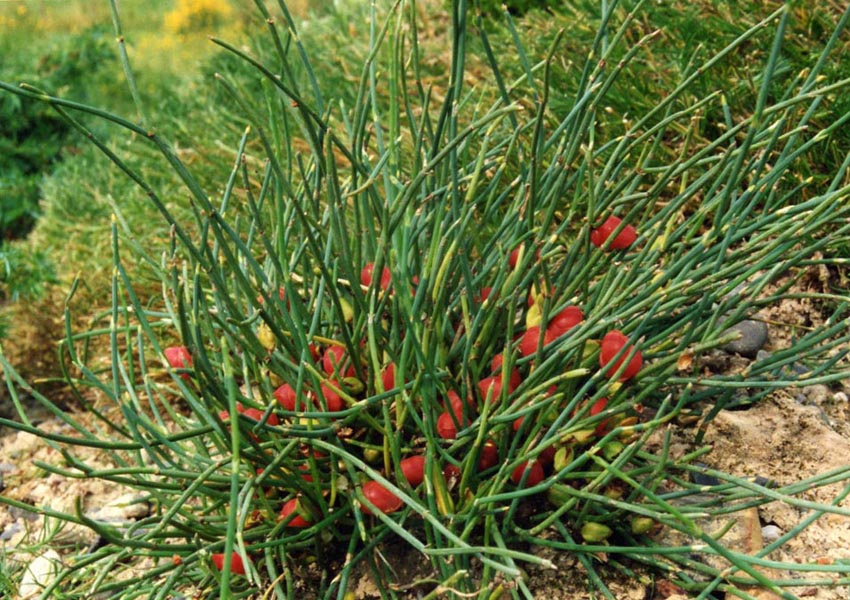Introduction
Ephedra is an evergreen shrub-like plant native to Central Asia and Mongolia. The principal active ingredient, ephedrine, is a compound that can powerfully stimulate the nervous system and heart. Ephedra has been used for more than 5,000 years in China and India to treat conditions such as colds, fever, flu, headaches, asthma, wheezing, and nasal congestion. More recently, ephedra was used as an ingredient in dietary supplements for weight loss, increased energy, and enhanced athletic performance.
What the Science Says
- An NCCAM-funded study that analyzed phone calls to poison control centers found a higher rate of side effects from ephedra, compared with other herbal products.
- Other studies and systematic reviews have found an increased risk of heart, psychiatric, and gastrointestinal problems, as well as high blood pressure and stroke, with ephedra use.
- According to the U.S. Food and Drug Administration (FDA), there is little evidence of ephedra’s effectiveness, except for short-term weight loss. However, the increased risk of heart problems and stroke outweighs any benefits.
Side Effects and Cautions
- In 2004, the FDA banned the U.S. sale of dietary supplements containing ephedra. The FDA found that these supplements had an unreasonable risk of injury or illness—particularly cardiovascular complications—and a risk of death. The ban does not apply to traditional Chinese herbal remedies or to products like herbal teas regulated as conventional foods.
- Between 1995 and 1997, the FDA received more than 900 reports of possible ephedra toxicity. Serious adverse events such as stroke, heart attack, and sudden death were reported in 37 cases.
- Using ephedra may worsen many health conditions such as cardiovascular disease, kidney disease, and diabetes.
- Ephedra may cause seizures in otherwise healthy people as well as in people with seizure disorders.
- Taking ephedra can also result in anxiety, difficulty urinating, dry mouth, headache, heart damage, high blood pressure, irregular heart rhythms, irritation of the stomach, kidney stones, nausea, psychosis, restlessness, sleep problems, and tremors.
- Women who are pregnant or breastfeeding and children should avoid taking ephedra.
- Ephedra use may lead to serious health problems when used with other dietary supplements or medicines.
- Combining ephedra with caffeine increases the risk of potentially serious side effects.
- Tell all your health care providers about any complementary health practices you use. Give them a full picture of what you do to manage your health. This will help ensure coordinated and safe care. For tips about talking with your health care providers about complementary and alternative medicine
Products regulated as drugs that contain chemically synthesized ephedrine are not dietary supplements and are not covered by this rule. These include drugs used for the short-term treatment of asthma, bronchitis, and allergic reactions.
Sources
- Ephedra. In: Blumenthal M, Goldberg A, Brinckman J, eds. Herbal Medicine: Expanded Commission E Monographs. Newton, MA: Lippincott Williams & Wilkins; 2000:110–117.
- Ephedra. Natural Medicines Comprehensive Database Web site. Accessed at www.naturaldatabase.com on May 8, 2009.
- Ephedra (Ephedra sinica)/Ma huang. Natural Standard Database Web site. Accessed at www.naturalstandard.com on May 8, 2009.
- Shekelle PG, Morton SC, Hardy ML, et al. Ephedra—Is It Worth the Risk? RAND Web site. 2003; RB–4556. Accessed at www.rand.org/pubs/research_briefs/RB4556.html on June 18, 2013.
- Thurn AL. Ephedra (Ma Huang). In: Coates P, Blackman M, Cragg G, et al., eds. Encyclopedia of Dietary Supplements. New York, NY: Marcel Dekker; 2005:189–195.
- U.S. Food and Drug Administration. Final rule declaring dietary supplements containing ephedrine alkaloids adulterated because they present an unreasonable risk. Federal Register. 2004;69(28):6788–6854.
- Woolf AD, Watson WA, Smolinske S, et al. The severity of toxic reactions to ephedra: comparisons to other botanical products and national trends from 1993–2002. Clinical Toxicology. 2005;43(5):347–355.



No comments:
Post a Comment